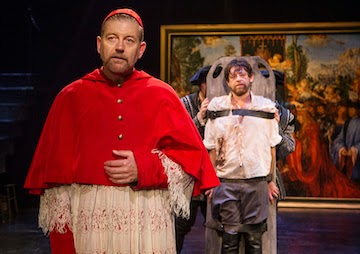Judith Thompson, as a playwright and a performer, has the ability to take hold of her audience with a single line and hold them in her grasp from beginning to end. In Watching Glory Die the moment she walks onstage her physical and vocal presence begins to sharply delineate, with a delicate balance of subtlety and smoldering rage - line by line, movement by movement - the emotional complexity of three characters trapped within the parameters of an institutional setting that has them all at odds with all they believe in and all they desire.
The life force that surrounds Glory is simultaneously
disturbing and poignant as the text and the performance give the characters a
kind of mysterious route through their response to the unyielding journey they
have been entrapped by - made all the more powerful by Ken Gass’ direction,
Debashis Sinha’s sound, Astrid Janson’s set & costumes, André de Toit’s lighting, and Cameron Davis’ Projection
Design - adding an indelible cinematic flare that gives the prison scenes a harrowing
atmosphere.
As Glory, her mother, and a prison attendant, Thompson
crafts distinct personas that take spectators in at the outset with finely
crafted vocal nuance and intricate stories that compose a beautiful lyric
journey to hell and back. And yet the final destination, as presented in the
title of this one-woman tour de force, has Glory lost in the machinations of a
system that demands she be pathologized beyond recognition. The rules and
regulations leave no room for the real Glory to be released from her cold,
inhuman surroundings.
 Thompson’s words and her performance do not make it easy for
audiences to unravel the characters they are presented with, and this is
the result of a brilliant playwright’s ability to create tragicomic pathos and hard won sympathy within three separate women through complex characterization. Loosely based on the story of Ashley Smith, a nineteen year old who
lost her life when she was on suicide watch at the Grand Valley Institution for
women, Thompson’s seventy-five minute script is a well-balanced argument
against the strictures that handcuff people to rules and regulations that fail
to allow any real, life saving interaction.
Thompson’s words and her performance do not make it easy for
audiences to unravel the characters they are presented with, and this is
the result of a brilliant playwright’s ability to create tragicomic pathos and hard won sympathy within three separate women through complex characterization. Loosely based on the story of Ashley Smith, a nineteen year old who
lost her life when she was on suicide watch at the Grand Valley Institution for
women, Thompson’s seventy-five minute script is a well-balanced argument
against the strictures that handcuff people to rules and regulations that fail
to allow any real, life saving interaction. Emotional intensity mixes with a paradoxical commingling of the disturbing and the comforting as Glory’s mother reminisces and tries to bring her daughter back through an almost eerie form of nostalgic utterance. Supported by the prison attendant’s own working class struggles, and Glory’s metaphoric battle with Crocodiles, the text and performer create a triumvirate of haunting journeys all connected by their tie to Glory - lost, found, and lost again.
Darkly comic moments around class and idiosyncratic imagery touch down here and there and give the overall experience a strong layered sense of Thompson’s sensitivity to the brutal comedy and tragedy that marks so many peoples lives. Although the ending wanders a little, and tends to have a an estranged sense of where to finally land, this may very well be the result of a theatrical and a life experience that becomes a battle - to the death - with maddening tears, heart wrenching loss, and life numbing regulatory control - all conspiring to reflect and refract the sheer impossibility of it all - an impossibility that cost Ashley Smith an entire lifetime of experience.
Ultimately, Watching Glory Die becomes a testament to the failure of certain social structures as
they confine human beings within impossible circumstances. The whole notion of an
entity named Corrections Canada
becomes a sad, frustrating, and tragic exercise in opposing forces that fail to correct a
tightly knit maze pf psychological imprecision long enough to serve a single
human being in pursuit of the truth buried beneath a pathologically asphyxiated and institutionally disconnected identity.
Canadian
Rep Theatre's world premiere production of Judith Thompson's
Watching Glory Die, until June 1 at Berkeley Street Theatre Upstairs


















